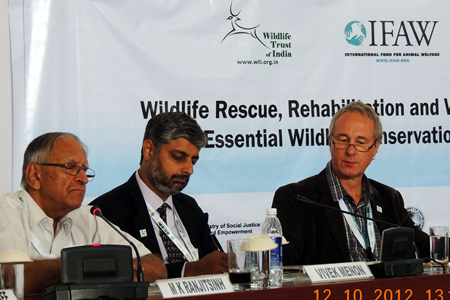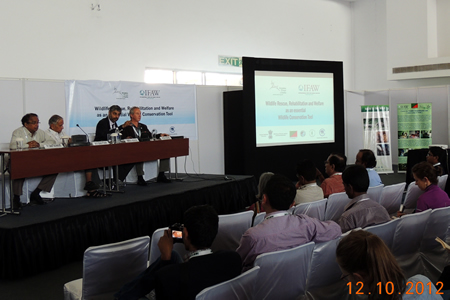CBD CoP : IFAW WTI advocates empathy for animals to achieve the convention’s targets
Dr MK Ranjitsinh , Vivek Menon and Peter Pueschel at the CBD CoP side event
Hyderabad, October 12, 2012: Advocating welfare of individual animals as a necessity for conservation, the International Fund for Animal Welfare – Wildlife Trust of India (IFAW-WTI) stressed on the need for empathy for all life forms – humans and non-humans – to direct efforts to successfully implement the Strategy of the Convention for Biological Diversity (CBD) effectively.
An IFAW-WTI event on the sidelines of the 11th Conference of Parties of the CBD was organised today to showcase ‘wildlife rescue, rehabilitation and welfare as an essential wildlife conservation tool’. Chairing the session, Dr MK Ranjitsinh, Chairman of WTI stressed, “Welfare is the bedrock of conservation.”
The CBD strategy spells out 20 Aichi targets on diverse issues focused on biodiversity conservation, sustainable use and equitable sharing of resources. “There are at least four Aichi targets – 1, 4, 5, 9, 11, 12 and 17, that needs to include animal welfare to achieve conservation goals,” said Peter Pueschel, Programme Director – IFAW. “However, there is a very general and inanimate perception about biodiversity here at conventions such as these. Policy makers should take notice, and consider biodiversity as what it is –living beings that have feelings and that matter.”
The IFAW-WTI has pioneered a number of unique animal welfare initiatives in India, in addition to many others by IFAW internationally. The IFAW-WTI run Centre for Wildlife Rehabilitation and Conservation (CWRC) that is in its 10th running year along with its Mobile Veterinary Service units have saved more than 1500 wild animal lives of about 166 species including tigers, rhinos, elephants, bears and clouded leopards.
“Conservation is generally about populations of species, but what we need to realise is that these populations are made up of individual animals. Unless we value and respect these individual lives, we will only be doing dispassionate conservation, and anything less than passionate is not likely to bear favorable results in the situation that we live in today,” said Vivek Menon, Executive Director, WTI.
CWRC has shown how individual animal welfare can be linked to conservation. As an example, orphaned rhino calves from Kaziranga were hand-raised at CWRC and moved to Manas, kickstarting the crucial reintroduction programme in 2006. This is helping recreate a population that was completely wiped out.
Likewise, elephant calves – displaced or orphaned – have been hand-raised and reintegrated with wild herds, if not reunited with their natal herds.
“Long-term rehabilitation rather than packing them off to zoos, is a viable and preferred option for displaced wild animals. How many animals can we afford to lose from our wilds? None. This is not only a welfare initiative, but over long-term accumulative rescue and rehabilitation work will have an impact on conservation. What we have been doing is not only returning the animals to contribute to the wild gene pool, but also establishing the trend of returning various displaced wildlife species back to the wild in India and mainstreaming this,” Menon added.
The IFAW-WTI event saw experts sharing their experiences, the difficulties faced and challenges overcome in bringing about focus on individual animal welfare. Prof PC Bhattacharjee, Executive Trustee, WTI, credited the Forest Department authorities of northeast India to have made this possible.
Documentaries on the rescue and rehabilitation activities undertaken by IFAW-WTI were also screened at the event, hosted by Dr NVK Ashraf, Chief Veterinarian of WTI.
Douglas Cress, Great Apes Partnership (GRASP) Programme Coordinator, and one of the attendees of the event said, “The work IFAW-WTI is doing is powerful and commendable. I congratulate you all. These video clips (of orphaned elephants, rhinos, clouded leopards being rehabilitated back in the wild) must be shown to the governments to bring about policy changes. You are literally putting value back in the forest.”











